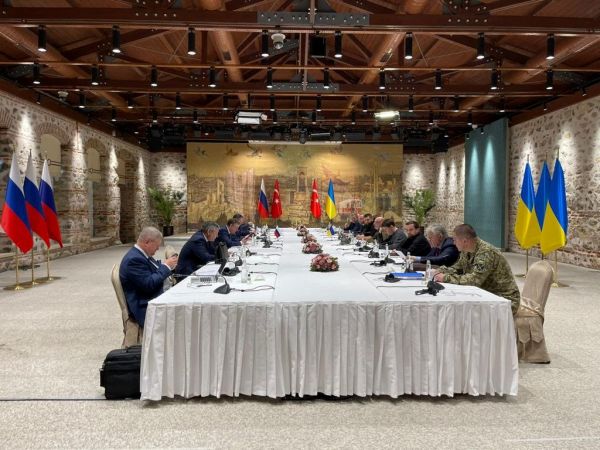German Media Reveals: How the West Destroyed the Russian-Ukrainian Peace Talks
Reference message networkReported on February 18 On February 15th, German foreign policy website published an article entitled "Western War Goals". The full text is as follows:
Wolfgang Ischinger, former chairman of the Munich Security Conference, called on NATO to reach an agreement on the "western war objectives" in the Russian-Ukrainian conflict. The German diplomat explained that "a political and strategic contact group" should be set up to make sure of this. For example, it must be determined whether to "encourage Ukraine to recapture Crimea militarily".
According to many sources, the west successfully destroyed the early end of the conflict in late March or early April last year. Due to the persistent opposition of NATO, especially Britain, the Russian-Ukrainian ceasefire agreement that was almost negotiated 10 and a half months ago failed.
In March 2022, the negotiations on a ceasefire and even a peace agreement between Ukraine and Russia have actually made considerable progress. On April 3, 2022, the British Daily Telegraph quoted a statement issued by Davide Ala Hamija, one of Ukraine’s main negotiators, as saying: "The Russian Federation has formally responded to all our proposals" and Moscow "accepted Ukraine’s position, except for the Crimea issue". Ukraine’s position is mainly that Russia should withdraw its troops from Ukraine — — Except Donbass and Crimea. The newspaper also quoted Russian negotiator Vladimir Mezinski as saying that Kiev has agreed to Moscow’s demands since 2014. As the newspaper explained, that mainly refers to Ukraine’s neutrality. Ala Hamija added that this matter will be settled now, and then the presidents of the two countries can get together and finalize everything at the highest level.
The Daily Telegraph’s report is consistent with the descriptions of many former US government officials. Fiona Hill and Angela Stent, two famous experts on US-Russia issues, relayed the descriptions of these officials in the bimonthly issue of American Diplomacy last September. Hill served on the National Security Council for many years. She said that American officials said that "Russian and Ukrainian negotiators seem to have reached an agreement on the outline of the interim negotiation solution." On the basis of this negotiation state, Ukrainian President Zelensky made a speech on the evening of April 4, 2022, supporting a rapid ceasefire.
The statement made by former Israeli Prime Minister Bennett in an interview provided further information. At the beginning of March last year, he acted as a mediator between Moscow and Kiev. He said that both Putin and Zelensky were willing to make concessions to stop the conflict. According to Bennett’s impression, they "strongly hope for a truce." Bennett said, but then the western powers blocked the negotiations. Bennett was convinced that there was "a good chance to achieve a ceasefire".
The investigation by Michael von der Schulenburg, the former executive representative of the UN Secretary-General and a diplomat, also confirmed that at that time, the western powers blocked the real opportunity to cease fire or even sign a peace agreement. According to von der Schulenburg, Russia and Ukraine reached an agreement in Istanbul on March 29, 2022: Russia withdrew its troops, Ukraine gave up NATO membership and abandoned the establishment of western military bases on its territory. However, at the special summit held in Brussels on March 23, NATO demanded that Russia cease fire and withdraw its troops even before further negotiations, but did not mention that Ukraine might give up NATO membership. The diplomat pointed out that Russia changed its strategy soon.
There are also some open sources that show how the West expresses its opposition to an early end to the Russian-Ukrainian conflict. The British "Times" said that the British government is worried about "some allies" — — Especially Germany and France — — "Too eager" for Zelensky to sign the agreement. Therefore, the then British Prime Minister Johnson called Zelensky on the last weekend of March 2022 to "warn" him not to negotiate further. Ukrainian Pravda also linked Johnson to the end of the peace talks: when the British Prime Minister personally arrived in Kiev on April 9, he brought "information", that is, the West had concluded that Putin was not as powerful as people thought before, and there was still a chance to "put pressure on him". The newspaper pointed out that Putin officially announced that the negotiations with Ukraine on the ceasefire agreement were "deadlocked" three days later.

Nearly a year after the start of the war and 10 and a half months after the Western countries broke the Russian-Ukrainian armistice agreement, Ischinger, former chairman of the Munich Security Conference, complained that there was no unified route within NATO for the conflicts that had not ended because of the insistence of major NATO members. He said: "Therefore, I think it is necessary to establish a political and strategic contact group to clarify the western war goals so that we all know … … Where to go. "